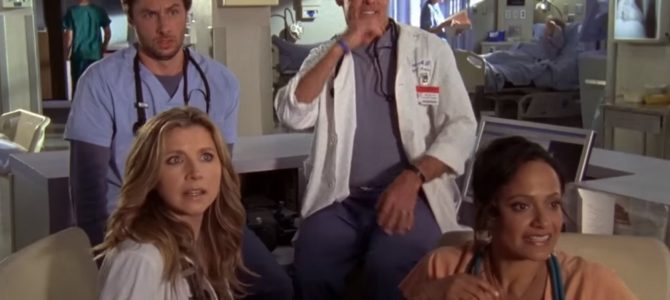In its waning moments, the “Scrubs” premiere brought John Dorian to a realization that set the tone for nine seasons. “You see,” he mused in a voiceover, “I can’t survive on my own.”
Those words aired 17 years ago this week, on Oct. 2, 2001, less than a month after the 9/11 attacks, three years before the launch of Facebook, and just weeks after Kelly Clarkson was crowned the first “American Idol” by millions of call-in votes.
Sandwiched by its second season in the coveted slot between “Friends” and “Will and Grace,” “Scrubs” is probably remembered more for busting the sitcom mold with its quirky entanglement of fantasy and reality than social commentary. The show offered comedy with depth, that much was always acknowledged. But its premise was important too.
That premise was established very clearly during the show’s premiere 17 years ago. Airing after the first episode of “Frasier’s” ninth season, the first 30-minute installment of “Scrubs” followed J.D. on his maiden shift at Sacred Heart, flailing amid the pressures of the job.
Tensions flared with Dr. Cox, a patient died on his watch. But as the episode drew to a close, J.D.’s emerging support system came into focus. Carla was imploring Cox to be nice to him, Elliot took care of an unpleasant task on his behalf, Turk remained his roommate. And as J.D. left the hospital, he was struck by that key realization. “I can’t survive on my own,” he thought.
That line was echoed almost verbatim at the outset of every single episode. “I can’t do this all on my own. I’m no Superman,” went the theme song. More than anything, “Scrubs” is the story of how J.D.’s entrance into the adult world was shaped and supported by his friends.
The show has aged well more than two decades after premiering, but society’s execution of the lesson in its premise has not. “Scrubs” came to us on the eve of social media’s ascent, just before young tech entrepreneurs were promising the rise of their platforms would bring about a utopian global community with robust social ties.
In 2004, the General Social Survey found, per the Washington Post, that “three-quarters of people in 1985 reported they had a friend in whom they could confide, only half in 2004 said they could count on such support.” Reacting to the results, Duke University sociologist Lynn Smith Lovin said in 2006, “There really is less of a safety net of close friends and confidants.”
“We’re not saying people are completely isolated. They may have 600 friends on facebook.com and e-mail 25 people a day, but they are not discussing matters that are personally important,” she added at the time.
A study published last year in the American Journal of Preventative Medicine found that heavy use of social media platforms was associated with heightened feelings of social isolation.
“It turns out that the people who reported spending the most time on social media — more than two hours a day — had twice the odds of perceived social isolation than those who said they spent a half hour per day or less on those sites,” NPR reported. “And people who visited social media platforms most frequently, 58 visits per week or more, had more than three times the odds of perceived social isolation than those who visited fewer than nine times per week.”
The impact of our fraying social ties is slowly coming into focus. Some see it in the rise of Donald Trump, or the opioid crisis. Whatever the cause or scope of the problem, it’s clear that we’re grappling with new concepts of friendship and community.
“Scrubs” finished its run in 2010, its premise never fading from the foreground of the plot. Of course, there’s nothing unusual about a sitcom celebrating friendship. But “Scrubs” specifically set out to illustrate how those bonds propel and support us. That alone makes it a show worth revisiting.
Binge if you must. But this time, consider rewatching the program alongside a friend or two.









